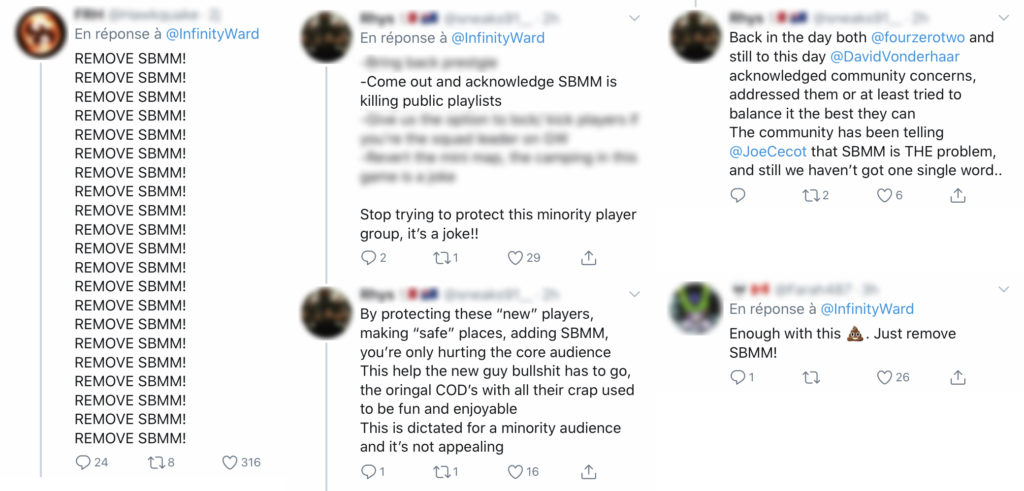Skill-based matchmaking (SBMM), a system that aims at matching players of similar skill level within the same game, was implemented into Call of Duty: Modern Warfare (2019). The aim is to create a more balanced experience for everyone, as lower skilled players get separated and shielded from highly skilled ones. However, the vocal Call of Duty community hates the system, wants it removed and do not hesitate to let developers know about it on a daily basis. It turns out the system actually offers significant benefits for the companies and games implementing it. As a result, it seems clear that Skill-Based Matchmaking is here to stay.
As an avid Call of Duty player and huge fan of Call of Duty 4: Modern Warfare and Modern Warfare 2, I was incredibly excited when Infinity Ward, the studio behind these games, announced it was rebooting the original Modern Warfare, the game that paved the way to the franchise’s success and inspired the entire FPS genre after it. Finally a throwback to the most glorious days of the franchise and a game I was excited to play after not having touched a Call of Duty game since Black Ops 2 (and besides the great remaster of CoD4, Modern Warfare Remastered).
However, when it got released and I played it, something felt off. From very beginning, I remember my friends warning me that the game was “incredibly ‘sweaty’ and full of ‘tryhards’”. I felt it immediately too. On every Call of Duty I had played before, my Kill/Death ratio (KD) always averaged 1.40. But in Call of Duty: Modern Warfare (2019), despite my best efforts, it only averages 0.80. It even fell as low as 0.65 when I first started with the game and I had to “grind my ass off” to get it to where it is now. Had I really become this bad at the game? Why did everyone else seem so good suddenly?
As it turns out, this experience is due to something called “Skill-based matchmaking” or SBMM for short. My frustration and poor experience with the game got me to put the controller down (so it wouldn’t end up inside my TV screen) and research the real reason behind this system.
The ‘reason’ behind Skill-Based Matchmaking
One can easily notice how SBMM is widely hated within the vocal Call of Duty community, just by having a look at the sheer number of vitriolic messages that get sent to the developers on their social media every day. Even I will admit I’m not a big fan. But what is exactly SBMM?

Skill-based matchmaking is a system that aims at matching players of similar skill level within the same game. That way it creates a more balanced experience for everyone, as lower skilled players get separated from highly skilled ones. And that is specifically the goal of this system. It protects new and lower-skilled players by ensuring they get shielded from more experienced opponents who would otherwise crush them. If they play at a lower level between them, the game feels fairer and they don’t get discouraged and stop playing.
Surely that sounds like a nice system, full of good intentions.
In the last few years, a change in priorities for video games…
It makes no doubt to recognize that in the last few years, and especially since Fortnite’s mind-blowing success, there has been a shift in video games’ priorities (here, I’ll be excluding indie games and devs from the conversation – as I don’t feel like it applies to them – and will focus specifically on AAA games). I was having this conversation with a friend the other day and we discussed how lately, video games need not only being fun, but also to make as much money as possible for studios and publishers alike. As I previously developed extensively, there used to be a time where games were sold for a premium. Developers would work on it for a few years, sell it for around $60, and wouldn’t touch it much after that besides for some minor adjustments and potential DLCs (Downloadable Contents). Now they don’t just develop the game; with it they also develop the way they’re going to make money over time, through a well-polished shop and attractive microtransactions.
It is exactly what is happening here with Modern Warfare. The game wasn’t thought out to be just another iteration in the franchise, but a full-on game as a service, meant to last, with regular updates and revenues generated over the long haul, as Activision Blizzard CEO Bobby Kotick noted during the company’s Q4 2019 earnings call. Hell, even the symbolic of rebooting the legendary Call of Duty 4: Modern Warfare should, by itself, be a good indicator of their long-term intentions for the game.
The psychological effects of Skill-Based Matchmaking (SBMM)
Modern Warfare (2019) is not the only game to implement SBMM. Another game that does is Apex Legends. As it turns out, a few months ago, developer on the game Eric Hewitt responded to someone complaining about SBMM on Twitter, pointing out that “there is indisputable evidence through data that [SBMM] helps out something like 80-90% of the community with retention for most of those games”. Kotick confirms the same phenomenon with Call of Duty: Modern Warfare, noting that the “engagement is up significantly” compared with previous Call of Duty. As a result, the SBMM system “will become the norm for most MP games” predicts Hewitt, despite acknowledging that it might indeed hurt the other 10-20% players.
SBMM will become the norm for most MP games, as there is indisputable evidence through data that it helps out something like 80-90% of the community with retention for most of those games… which hurts us 10%’ers, I know. Still though, ours might need some tuning potentially
— Eric Hewitt / Ghost (@GH057ayame) November 24, 2019
What hardcore and vocal players fail to realize when they complain is that a large but silent majority feels encouraged by this system and benefits from not getting crushed by far more experienced players. While about 10% of people get annoyed by SBMM and voice their discontentment every day to Infinity Ward’s community management team, the remaining 90% just silently enjoys the experience. They are then far more likely to return to the game regularly, which is called “player retention” and is incredibly important for game developers.
The importance of player retention in video games
Now if you are unfamiliar with this metric, you may wonder how retention is so crucial in video games, and games as a service especially. After all, the name doesn’t seem to suggest anything about making money. But actually, game marketers would certainly agree that retention is arguably the most important metric in free-to-play games and games that aim at building a long lasting (and profitable, mind you) relationship with players (i.e., games as a service). As GameAnalytics points out, “retaining users is generally an indicator of creating a ‘sticky’ or valuable app. […] The higher the retention rate, the more positive implications there are for future earnings from the app.”
In a blog post, DeltaDNA further develops that “revenue is often directly related to how long the player sticks with the game.” As a matter of fact, the more frequently players come back to a game, the more they are exposed to its shop – usually with rotating items available for a limited time only – and the more likely they are to purchase something as they would consider it a worthy investment given the time they spend playing it. And additionally, once they have made that first purchase, they are far more likely to spend even more in the future. As DeltaDNA explains, “there is another reason why encouraging players to spend multiple times is important; the average transaction value increases with each IAP (In-App Purchase).”



Therefore, it is crucial for developers to convert players into paying users by having them make that first purchase (conversion rate), so they feel more comfortable spending ever more later down the road. But before they make that first payment, they need to come back to the game regularly and therefore the number one step in the funnel is to have a high retention.
If a game has a good retention but a low conversion rate, it is a rather good news as developers can easily implement measures and incentives to convince players of spending. However, without a solid retention, it becomes increasingly harder to monetize players, as there are far fewer of them to work with and convert. In that case the game also has much bigger concerns as it probably needs some core rework to improve its overall enjoyment, attract and keep players engaged. A much less trivial task.
Skill-Based Matchmaking is here to stay
With skill-based matchmaking, Infinity Ward is essentially segmenting players based on their level, which “has huge benefits for monetization” as DeltaDNA points out. By implementing this system, they ensure there is no fixed difficulty curve but rather one specific to each player. The goal is, at the massive Call of Duty scale, to tailor the overall game experience to each player so they come back regularly and spend.
During my research, I saw many people defending the virtue of wanting to “shelter new players” so they don’t get destroyed by higher skilled players. And I get this argument. However, that is not the full picture. In the age of Games as a Service, I think it is time we stop hiding behind this noble excuse and acknowledge the real reason behind skill-based matchmaking in recent multiplayer games. Infinity Ward and the others did not implement it because they want to protect new and lower-skilled players, that’s not the end goal; they did it because it drastically increases their retention and brings them a lot more money. If it didn’t, I can almost guarantee that developers would have never bothered developing it in the first place.
So to all my sweaty fellow gamers, whether you like it and whether you complain to developers every day or not, I have some bad news for you: SBMM isn’t going away any time soon. The best you can hope for is that it gets toned down a bit. But so long as it brings Bobby Kotick* this much money, I can assure you that no amount of developer abuse on Twitter and Reddit may convince him that they should remove it. For now, you’ll just have to grit your teeth and learn to feel satisfied with your sweaty games and your 0.80 KD ratio. I swear I’m not salty (I am).
Ultimately, I think skill-based matchmaking reveals something far more important (and maybe concerning) for the future of video games: a blurring of the lines between gameplay and business model. I’ll explore this subject deeper in a future article.
*Here, I’m isolating Bobby Kotick for comedic purposes, but the whole video game industry benefits from it: studios, publishers, and investors alike.







Just have a comp game mode, simple as that
“Infinity Ward and the others did not implement it because they want to protect new and lower-skilled players, that’s not the end goal; they did it because it drastically increases their retention and brings them a lot more money”
Can’t it be both? Shielding players keeps them happy, and therefore keeps the game profitable. That also means you can be sure to be enjoying an actively developed platform for many years to come.
But also, by your argument ANY feature that improves the game for players is all about making money. Adding a bunch of new game modes keeps gamers interested, drastically improves the game and… oh… increases retention, makes money. Should we snub them because it’s only about profit?
Look, I get why this irks some people. I got my best K/D last night, and I’m terrible, honestly. And top players are now getting similar K/Ds. So, yeah, it makes their stats hard to compare – but do top games really want to be stuck in a match picking off 50+ kills from the newbs? Surely not? Don’t you feel up to the challenge of playing against others of a similar level?
I, for one, love it. Most of the time I’m playing with friends who are WAY better than I. And it shows. I get very demoralised because most times, I’m dead before I’ve even got a shot in. Then last night I played on my own, and the algorithm put me with people more balanced for me, and I had a great time. Surely that works both ways?
Hey Martin, thank you for your comment and perspective!
“Can’t it be both? Shielding players keeps them happy, and therefore keeps the game profitable. That also means you can be sure to be enjoying an actively developed platform for many years to come.”
It’s certainly true. And for the record, I have nothing against players (rather, a majority of them) having fun. However, my argument is that this system wasn’t born out of concern for players. It was born out of concern for Bobby Kotick and how do we ensure he keeps making $40M a year. Claiming otherwise, like I’ve read and heard multiple times, is, in my opinion, not true.
“But also, by your argument ANY feature that improves the game for players is all about making money. Adding a bunch of new game modes keeps gamers interested, drastically improves the game and… oh… increases retention, makes money. Should we snub them because it’s only about profit?”
What you’re mentioning here is very interesting and something I’ve been thinking about for a while. I plan on digging into this subject and write about it later in a dedicated, more precise, researched and nuanced piece. But yes, I believe there is an argument to be made in that regard. For now, I’ll say I’m all for adding new games modes, skins, content, etc. to keep the game fresh and interesting. However, SBMM is different in my opinion.
I obviously wrote about it from my perspective and based on my experience with it. I think it’s pretty clear that I’m personally not a big fan of SBMM. But neither am I not up for a challenge against stronger players every once in a while. However, there’s a distinction between an occasional challenge and sweating my ass off every game like I’m playing the Call of Duty League.
I have played Call of Duty since COD4, when there wasn’t such a system. I remember when I first started playing online, I was getting destroyed. Same at the beginning of MW2, where I really got into the series. But I wasn’t not having fun because of this.
Actually, that didn’t drive me away from the game or prevent me from getting better. I got better by playing regularly with the goal of improving, watching tutorials and learning from good players on Youtube, not by getting shielded by the system. After some time, I could play fairly well, sometimes crushing newbs, sometimes getting crushed by way stronger players carrying the enemy team. But THIS, I think, was enjoyable. You worked hard to improve, started making better scores and K/Ds overall during your games and could see your progress. It was rewarding and it felt earned.
With the current SBMM, you grind every game, only to become better and get rewarded by facing stronger enemies, around your newly acquired level. So you basically never see or feel any progress as you just keep playing difficult games that have you raging and on the edge of your seat. How’s that for fun? Sometimes you just want to relax and have a chill game. Sometimes it feels good to be the top player by a crushing margin. But that just does not happen in Modern Warfare.
Happy to debate further.